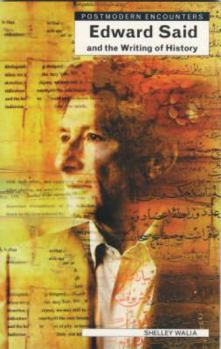Edward Said and the Writing of History
(Part of the Postmodern Encounters Series)
Said famously argued in 'Orientalism' that the West developed, at the peak of colonial expansion, a body of knowledge that imperialists could use to gain power. Walia investigates the need for... This description may be from another edition of this product.
Format:Paperback
Language:English
ISBN:1840462701
ISBN13:9781840462708
Release Date:August 2001
Publisher:Totem Books
Length:79 Pages
Weight:0.05 lbs.
Dimensions:0.3" x 4.3" x 7.2"
Customer Reviews
1 rating
Politics of (re)writing history
Published by Thriftbooks.com User , 22 years ago
Politics of (re)writing HistoryPOST MODERN ENCOUNTERS: EDWARD SAID AND THE WRITING OF HISTORYBY SHELLEY WALIA, p 77, [price]Icon: CambridgeAllen & Unwin: AustraliaEarlier attempts to simplify matters only ended up in excessive and unnecessary scholarship, leaving you all the more bewildered in the labyrinth of postcolonial theory. The task of explaining and clarifying the fundamental concepts had been undertaken by jargonizing it to the highest possible magnitude. But here, in this book, the author goes straight to the crux of post colonial cultural studies by taking up the central most issue of (re)writing history within the context of recent debates on ideology as a system of representation. In an earlier essay, "History and Its Discontents" (Between Truth and History), Shelley Walia had expressed that "traditional practices of writing of history fail to question the conditions of their own making and therefore retard any development of democratizing critical intelligence". Thus it becomes the need of the recent times to challenge the "nature of objectivity, realism, and truth which traditional historians take as their essentials".The present book, though succinct, proves significant in illuminating the notions and ideas associated with postmodern theories through the kaleidoscopic vision of a great literary and post colonial critic, Edward Said. Walia's concise introductory study examines him in the light of his engagement as writer, teacher, and political activist. Tracing the evolution of Said's thinking over the last thirty years, he draws attention to its conceptual coherence and value as a work-in-progress of cultural and historical critique, thereby emphasizing Said's involvement in public cultural activity and personal commitment to his insistent interrogation of political systems."Exile is a universal figure", says George Lamming and no one could apprehend this better than Said who has lived his life as an American as well as a Palestinian. But for Said "exile" is a position of an intellectual critic from where he can question the accepted tenets of society and also unveil the essentialised truths to reveal the quashed realities. How far is history-writing free from prejudices and to what extent does it bring to light disinterested facts is quite debatable. However the author doesn't intend to show that Said, by advocating reinterpretation of history, considered all historical accounts adulterated with political objectives of their writers. He is only trying to elucidate the true aim of these scholars in employment of this practice of history-writing and other cultural forms as a vehicle of subjugation and a hegemonic strategy.Shelley Walia, brings `History and Literature' on the same platform to emphasize that "no writing is transparent". Applying Derrida's concept of `differance' to historical narratives and literary texts, one can contemplate that there cannot exist a single interpretation and that some meaning is always le





